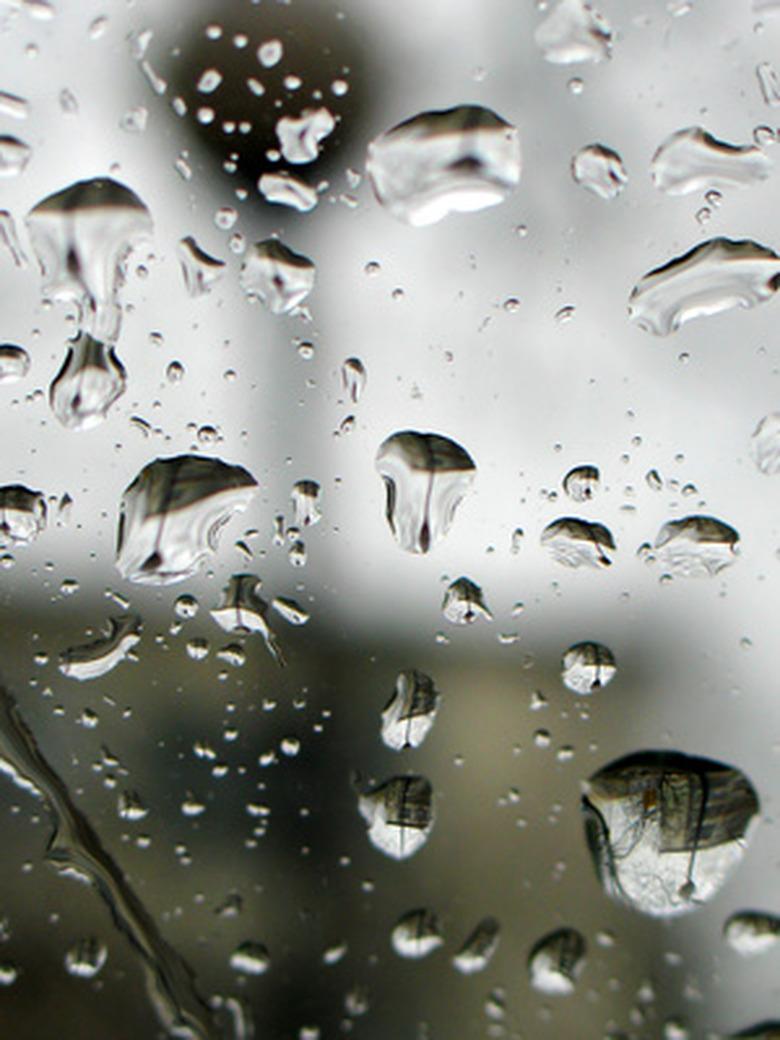Substances That Are Impermeable To Water
The permeability or impermeability of any substance is dependent upon its physical characteristics and the characteristics of the forces, things and substances it comes in contact with. An impermeable substance is one through which substances like liquids or gases cannot pass. In some cases, a substance will be impermeable to liquid but permeable to gas. Substances and materials that are impermeable to water are important as they contribute to keeping us dry and protected from water.
Glass
Glass
Glass is a composite substance made from a mixture of quartz sand, soda and lime. According to Consumers Glass, "human-made glass is believed to be the oldest manufactured substance in the world." Window panes, containers, dishware and other human-made glass products are impermeable to water. Glass also exhibits a degree of impermeability to heat and cold transfer.
Plastic
Plastic
Materials and things made of plastic, a mixed substance, are impermeable to water. Though Parkesine and Bakelite were invented in the late 1800s, the invention of synthetic plastic polymers in the 1900s contributed to the development of all kinds of impermeable materials, including Styrofoam, PVC, vinyl and thin plastics such as shrink wrap. Today, plastic products are everywhere, with shared properties that include electrical resistance, flexibility, impermeability to water, and in some cases, transparency. Plastic's impermeability to water makes it a choice material for the manufacture of a wide range of products, including irrigation pipes, septic tanks, waterproof clothing, composite plastic-wood products and protective coverings.
Metals
Metals
Metals and metal alloys such as aluminum, copper and iron alloys, including stainless steel and cast iron, are impermeable to water and other liquids. Metals are commonly used in manufacturing machinery, large ships, automobiles, cooking and building materials. Aluminum siding increases a home or building's impermeability to water and other elements. Painting, plating and an application of enamel or plastic polymers is used to prevent corrosion on most metals.
Rock
Rock
Clay, shale and slate are rocks that do not allow water to pass through and are therefore classified as impermeable. Unlike permeable rocks that absorb water, impermeable rocks can support and change the beds of rivers and streams, are prone to erosion, and can prevent the flow of groundwater. The latter is commonly referred to as an aquiclude. Composite rock materials such as concrete or brick are porous and allow for the seepage of water, unless treated with a water-proofing substance.
Cite This Article
MLA
Kimber, Joy. "Substances That Are Impermeable To Water" sciencing.com, https://www.sciencing.com/substances-impermeable-water-7458394/. 24 April 2017.
APA
Kimber, Joy. (2017, April 24). Substances That Are Impermeable To Water. sciencing.com. Retrieved from https://www.sciencing.com/substances-impermeable-water-7458394/
Chicago
Kimber, Joy. Substances That Are Impermeable To Water last modified March 24, 2022. https://www.sciencing.com/substances-impermeable-water-7458394/
